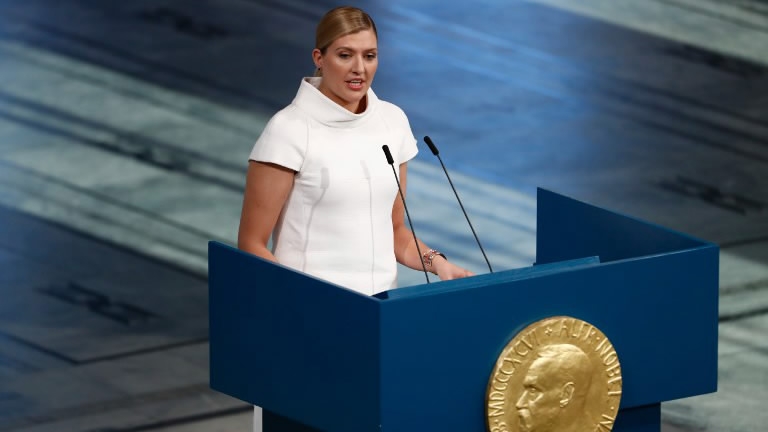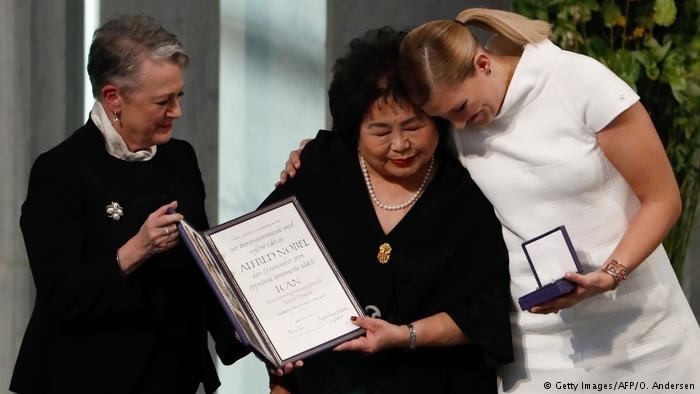
Politics
21:49, 10-Dec-2017
Nobel peace laureate group urges nuclear powers to adopt ban-the-bomb treaty
CGTN

The leader of the group that won this year's Nobel Peace Prize has urged nuclear nations to adopt a United Nations treaty banning atomic weapons in order to prevent "the end of us."
The International Campaign to Abolish Nuclear Weapons (ICAN) was awarded this year's Peace Prize by a committee that acknowledged the spread of nuclear weapons and the growing risk of atomic war.
ICAN is a coalition of 468 grassroots non-governmental groups that campaigned for a UN Treaty on the Prohibition of Nuclear Weapons, adopted by 122 nations in July.
The treaty is not signed by – and does not apply to – any states that already have nuclear arms.
Beatrice Fihn, ICAN's executive director, urged them to sign the agreement.
"It provides a choice. A choice between the two endings: the end of nuclear weapons or the end of us," she said in her speech at the prize-giving ceremony in Oslo.
"The United States, choose freedom over fear. Russia, choose disarmament over destruction. Britain, choose the rule of law over oppression," she added, before urging France, China, India, Pakistan, the Democratic People's Republic of Korea and Israel to do the same.
Israel is widely assumed to have nuclear weapons, although it has neither confirmed nor denied this.
"A moment of panic or carelessness, a misconstrued comment or bruised ego, could easily lead us unavoidably to the destruction of entire cities," she added.
"A calculated military escalation could lead to the indiscriminate mass murder of civilians."
Fihn delivered the lecture together with Setsuko Thurlow, an 85-year-old survivor of the Hiroshima atomic bombing and now also an ICAN campaigner.

/AFP Photo
/AFP Photo
Thurlow recalled some of her memories of the 1945 attack on Japan.
She was rescued from the rubble of a collapsed building about 1.8 kilometers from Ground Zero, she said, while most of her classmates who were in the same room were burned alive.
"Processions of ghostly figures shuffled by. Grotesquely wounded people, they were bleeding, burnt, blackened and swollen," she said.
"Parts of their bodies were missing. Flesh and skin hung from their bones. Some with their eyeballs hanging in their hands. Some with their bellies burst open, their intestines hanging out. The foul stench of burnt human flesh filled the air."
The United States, Britain and France sent second-rank diplomats to the Nobel ceremony, which Fihn earlier told reporters was "some kind of protest."
Japan, which is the only country to suffer atomic bombings and now relies on the US nuclear umbrella, has also not signed the treaty.
In a statement late on Sunday, Japanese Foreign Minister Taro Kono expressed respect for the efforts of atomic bombings survivors toward a nuclear-weapons free world.
But he added: "It is essential to steadily seek ways to advance nuclear disarmament realistically, while responding appropriately to real threats, including the DPRK’s nuclear and missile development programs."
7031km
Source(s): Reuters

SITEMAP
Copyright © 2018 CGTN. Beijing ICP prepared NO.16065310-3
Copyright © 2018 CGTN. Beijing ICP prepared NO.16065310-3